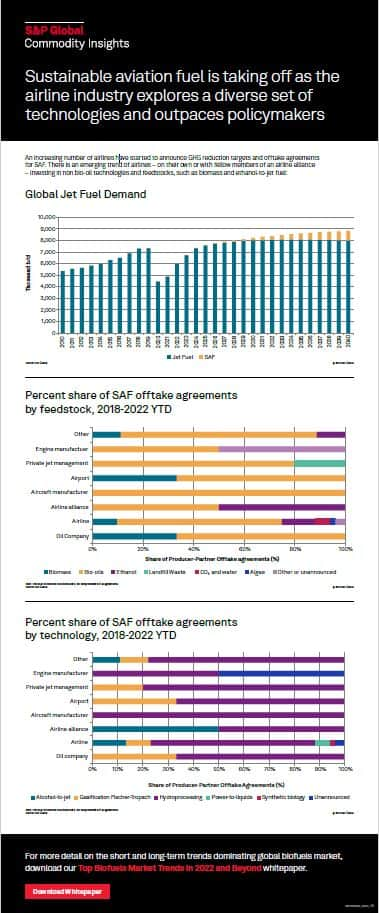Sustainable aviation fuel is taking off as the airline industry explores a diverse set of technologies and outpaces policymakers
The move towards reducing CO₂ emissions from aviation has been gaining ground in the last few years. An increasing number of airlines have started to announce GHG reduction targets and offtake agreements for sustaible aviation fuel (SAF). There is an emerging trend of airlines - on their own or with fellow members of an airline alliance - investing in non bio-oil technologies and feedstocks, such as biomass and ethanol-to-jet fuel.
Hydroprocessing remains the dominant technology and bio-oils are still the main feedstock, but gasification Fischer-Tropsch and other technologies that use biomass, landfill waste and ethanol-to-jet are emerging as alternative feedstocks in some recent agreements. The S&P Global Commodity Insights outlook for renewable jet fuel is for growth starting in the latter half of this decade. The airlines' foray into a more diverse set of novel technologies could be due to the substantial SAF volumes needed yet relatively few fuel choices available to a large commercial aircraft due to energy density and safety requirements. Agricultural innovations also have great potential to reduce the CI of feedstocks, such as ethanol, sugar and biomass, compared to waste oils and fat. This trend of airlines signing offtake agreements with producers utilizing innovative SAF technologies is expected to continue.
Please find the below infographic summarising the growth of global demand for SAF:
For more detail on the short and long-term trends dominating global biofuels market, download our Top Biofuels Market Trends in 2022 and Beyond Whitepaper by clicking here.
This article was published by S&P Global Commodity Insights and not by S&P Global Ratings, which is a separately managed division of S&P Global.

